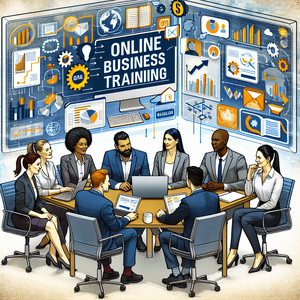
Bridging Training and Job Success: 15 Essential Roles in Development
In today’s fast-paced work environment, the ability to adapt and continuously improve is essential for both employees and organizations. Effective training and development programs are at the heart of this evolution, as they empower employees to excel and contribute to their organization's success. Companies that prioritize comprehensive training see notable enhancements in employee engagement, retention, and productivity. This article explores 15 key roles in training and development, highlighting how each position contributes to connecting training initiatives with job performance and overall organizational objectives.
Job Summaries:
Training and Development Specialist:
- Training and Development Specialists play a pivotal role in designing, implementing, and assessing training programs that enhance employee capabilities.
- They evaluate training needs and align programs with organizational goals.
- They ensure that employees acquire skills directly applicable to their roles.
- A degree in human resources or a related field is essential for this position.
- Strong interpersonal skills are essential for this position.
- This position serves as a cornerstone for employee competitiveness and growth.
Instructional Designer:
- Instructional Designers create dynamic educational programs that resonate with specific learning objectives.
- By collaborating with subject matter experts and analyzing learner needs, they craft engaging curricula that improve knowledge retention.
- Proficiency in e-learning technologies and a background in instructional design are crucial.
- Their expertise significantly enhances the relevance of training, ensuring that employees can apply their learning effectively in their daily tasks.
Corporate Trainer:
- Corporate Trainers are responsible for delivering tailored training sessions that focus on enhancing employee skills and knowledge.
- They adapt content to meet the unique needs of their organizations through workshops, seminars, or online courses.
- A background in education and expertise in relevant topics are typically required.
- They play a vital role in building a competent workforce that can translate training into effective job performance.
Learning and Development Manager:
- Learning and Development Managers oversee the strategic direction of training initiatives, ensuring they align with company goals.
- They set objectives, manage budgets, and cultivate a culture of continuous learning.
- A bachelor’s or master’s degree in human resources or organizational development, along with experience in training management, is often needed.
- This leadership role is essential for fostering an environment that prioritizes employee growth and development.
Onboarding Specialist:
- Onboarding Specialists are critical in welcoming new employees and facilitating their integration into the company.
- They provide effective orientation programs that cover company culture, policies, and job responsibilities.
- They enhance job satisfaction and retention rates.
- Strong communication skills and a background in human resources are essential for this role.
- This role ensures a positive start for new hires.
Talent Development Coach:
- Talent Development Coaches work closely with individual employees to identify skills gaps and create customized development plans.
- By providing guidance, support, and constructive feedback, they help employees achieve their professional goals.
- A background in coaching or mentoring, coupled with industry experience, is beneficial.
- This role significantly contributes to overall team performance by fostering individual growth.
HR Development Consultant:
- HR Development Consultants analyze training needs and design strategic initiatives that align with business objectives.
- Collaborating with leadership to enhance employee engagement and performance.
- They play a key role in ensuring that training programs effectively meet organizational goals.
- A degree in human resources or organizational behavior is often required, along with consulting experience.
eLearning Developer:
- eLearning Developers create online training courses using a variety of multimedia tools.
- Their expertise in instructional design software and understanding of adult learning principles are crucial for enhancing training accessibility and scalability.
- Typically requiring a degree in instructional design or a related field, this role makes learning available to employees across various locations, ensuring they can upskill effectively.
Training Coordinator:
- Training Coordinators manage the logistical aspects of training programs.
- They are responsible for scheduling, organizing materials, and tracking participation.
- They act as a liaison between trainers and participants.
- They play a crucial role in executing training initiatives smoothly.
- Strong organizational skills are important for this role.
- A background in administration or human resources is beneficial.
- They ensure that training aligns with employee development goals.
Performance Improvement Consultant:
- Performance Improvement Consultants focus on analyzing organizational performance challenges and recommending training solutions to boost productivity.
- By identifying skill gaps through assessments, they develop targeted training strategies.
- Typically requiring experience in performance management or organizational development, this role is vital for ensuring that training initiatives lead to tangible business outcomes.
Workplace Learning Facilitator:
- Workplace Learning Facilitators lead informal learning sessions that encourage ongoing professional development.
- They may conduct peer-to-peer learning or facilitate discussions on best practices.
- Strong facilitation skills and a background in adult education are essential for fostering a culture of continuous learning and knowledge sharing, enhancing employee engagement.
Training Analyst:
- Training Analysts evaluate the effectiveness of training programs through data collection and analysis.
- They assess employee performance and gather feedback to inform future training initiatives.
- A degree in business or data analysis, along with strong analytical skills, is typically required.
- This role is crucial for refining training strategies to ensure they align with organizational needs.
Mentorship Program Coordinator:
- Mentorship Program Coordinators develop and manage mentorship initiatives.
- Pairing mentors with mentees.
- Providing resources to support mentorship relationships.
- Strong interpersonal skills are essential.
- Experience in human resources or program management is important.
- Key to fostering valuable connections that enhance employee growth and learning.
Compliance Trainer:
- Compliance Trainers educate employees on legal and regulatory requirements relevant to their roles.
- They develop training materials that ensure staff understand compliance issues and best practices.
- A background in law or compliance, along with teaching experience, is often necessary.
- Their work is critical for minimizing organizational risk and ensuring adherence to regulations.
Organizational Development Specialist:
- Organizational Development Specialists enhance organizational effectiveness through targeted training and development initiatives.
- They assess needs, design programs, and evaluate their impact on performance.
- A degree in organizational psychology or business administration, along with change management experience, is commonly required.
- This role ensures that employee development aligns with the strategic goals of the organization.
The diverse roles within training and development highlight the vital connection between effective training and successful job performance. Each position contributes uniquely to creating a skilled workforce that drives organizational success. For those interested in exploring current job openings in these roles, numerous opportunities await to bridge the gap between training and job performance.
Explore More Jobs

